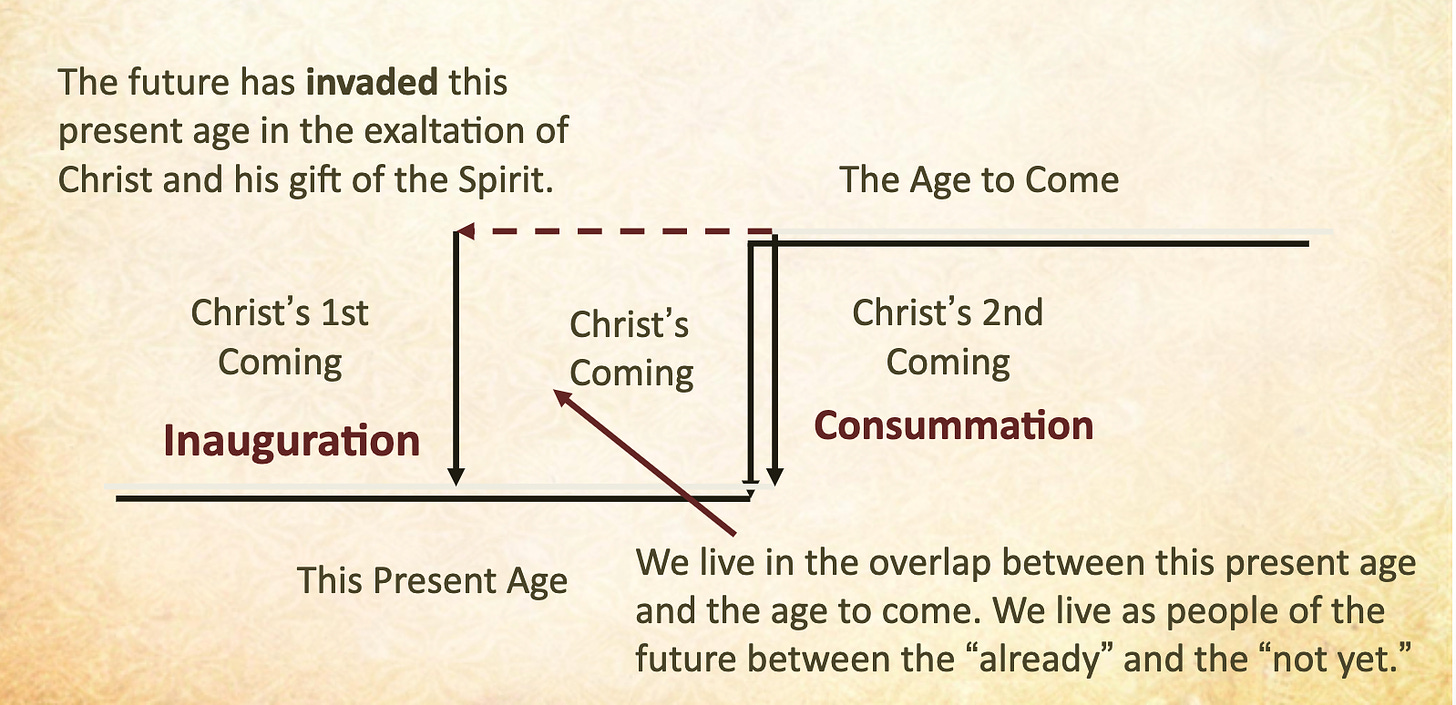The central thesis of L. Ann Jervis’s new book, Paul and Time: Life in the Temporarity of Christ, is that inaugurated eschatology, or the overlap of the present with the future, or the presence of the future inadequately describe Paul’s theology of time. I have posted this image already but it’s vitality among NT professors and preachers is well-known: it’s what most believe.
Source: https://slideplayer.com/slide/6817164/
A wrinkle for me. In my early days of Bible study, especially when reading Paul’s letter to the Ephesians, I was taught our position in Christ over against our practice in Christ. Put differently, our position is that we are righteous while our practice is an ongoing matter of sanctification. Somehow in my life that set of ideas more or less was put on mute but Jervis’s thesis has reminded me of our position in Christ.
Her style of writing is the style of a teacher: repetition, or as the Greeks said, meletē to pan.
Again, the big idea for most scholars is that the Jewish two-age understanding of time (The Present Age and the Age to Come) was adapted Paul as he replaced the Age to Come with the New Age, which (as you can see above) overlaps with the Present Age until the Parousia.
First, she makes it clear that Paul does not explicitly speak of the “New Age.” As she puts it, “the lack of reference to ‘new age’ does make problematic the assumption that an explicitly two-age temporal structure framed Paul's interpretation of Christ's resurrection.”
Second, she finds problematic also that Paul would squeeze Jesus into his inherited framework, making that inherited framework the core of his theology. This is why Jervis is so critical of the salvation historical approach to Paul's theology.
Third, “Paul regarded not the new age but life in and with Christ as God's goal for humanity.” Thus, instead of a Present Age fulfilled in a New Age she sees the promises fulfilled in Christ. It is critical for Jervis then to center Christ, christology, rather than salvation history or kingdom or eternal life or new creation. I am totally on board with centralizing Christ. For her, then, “new creation, Kingdom, and eternal life are the consequences and conditions of life with Christ. Paul's overriding focus is on Christ; when he associates new age concepts with Christ, Christ remains the focus.
Fourth, Jervis briefly sketches “new creation” in Galatians 6:14-15 and 2 Corinthians 5:17, concluding for each that the emphasis is not new creation or new age but Christ, being in Christ, and the benefits of blessing in Christ. She turns then to kingdom in Paul and concludes once again that the essential emphasis is “in Christ” not new age. One quotation: “the Kingdom, however, is not the focus, nor is it presented as the goal. The focus is Christ.” She does the same with eternal life. They are blessings of union with Christ.
Overall she is presenting how best to frame Paul’s theology. It is not salvation history or inaugurated eschatology but Christ. “Paul conceived of the present aeon and the exalted Christ as two mutually exclusive realities.” That’s her thesis. “This creates a reality – the reality – that reveals the poverty, impotence, and finitude of the present age and allows for life sustained and shaped by Christ alone. The crucified, risen, and exalted Christ does not engage with the present age but lives liberated from it.”
Which leads, fifth, to a major idea: in Christ is life and believers are in “life-time.” Outside is “death-time.” “Consequently, Paul portrays believers as living entirely in Christ.” We are liberated from the present age, not a part of it. We are not in it and not in it at the same time. We are out of it if we are in Christ. Union with Christ is not partial; it is complete.
Christ lives life-time; the present temporality is death-time. “Paul is not much interested in new age concepts except as they help him to convey the magnitude of God's transformation of existence by means of Christ. Paul's attention is on Christ and the wonders attending to union with him enabled by the spirit [sic]. The apostles conception of the temporality lived by the faithful is shaped not by a two-age framework but by Christ.”
One more time now: “The fact must be acknowledged that the apostle speaks not about the old age and the new but rather about the present evil age and Christ. We do not find evidence that Paul regarded Christ as a stand-in for the expected new age of a Jewish apocalyptic. Paul understands Christ as an actual being in whom people may live. … Paul asserts not that believers live in a new age but that they are joined to Jesus Messiah.”






I like this a lot!
Paul did, does, and will always have a unique perspective and Life-System in Christ. It has always drawn me to his writings. I see a connection of this with how Jesus communicated eternal life, the fullness of life, and the sense of a static electricity of “The Kingdom of God has come near.” This perspective alludes to the living fullness Jesus’ new covenant, for all, right now. Thank you!
I’m going to have to chew on this one a while.